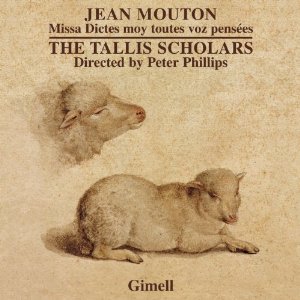The Holbein drawings of sheep (lambs, actually) on the CD cover are a charming symbolic visual nod to composer Jean Mouton, and the Tallis Scholars performances offer a first-class musical tribute to this lesser-known but eminently worthy contemporary of Josquin. What’s more, this program features some of the finest male-voice singing ever recorded by this ensemble, owing to the very compatible lineup of singers, but also to music that lies so favorably and so beautifully exploits the textural and timbral benefits of lower-register scoring.
The big work, Mouton’s Missa Dictes moy toutes voz pensées, is based on a three-voice chanson by 15th-century Flemish (or French) composer Loyset Compère, another in that class of expert and talented musicians of the period who may be obscure to today’s listeners but who was widely known in his day. And justifiably so: this is top-drawer music by any standard. As for Mouton’s Mass, in addition to its highly sophisticated canonical writing, it features an Agnus Dei II scored for three basses—a unique feature that conductor Peter Phillips found irresistible. (You’ll see just how much the performers relished this unusual focus on the oft-taken-for-granted bass voices when you flip through the liner booklet and find the trio posed in a series of shots ranging from “blues brothers” garb to businessman chic.)
Yes, there are female singers present—an alto paired with a male alto in all of the works, and two sopranos in a few of the motets—but the timbres in each case are so closely matched with the male voices, and the ranges are restricted enough, that these voices never come across as distinctly apart from the others. The five motets are all gems—not a hint of second-rate music here; especially affecting are the two Ave Marias.
For those who may be interested, Tallis Scholars baritone Donald Greig just published a novel, Time Will Tell, in which Loyset Compère plays something of a part, as do Josquin, Ockeghem, a modern British early music vocal ensemble (which happens to be named Beyond Compère), a driven yet distracted and slightly suspect American musicologist, and several other characters who live in the rarefied, inbred, and therefore very quirky world of those whose lives center around ancient manuscripts, isorhythms, canons, modes, cantus firmi, gimells, musica ficta, and other assorted ancient codes, practices, and mannerisms. The story—”of treachery, and ambition, and famous composers”—offers something of an inside, albeit very brief, look at this small world, and I can’t help but wonder how much of the story of this recording and of Greig’s Tallis Scholars experiences was filtered into his colorful and intriguing book.
Nevertheless, this latest disc is another outstanding and successful addition to Peter Phillips and the Tallis Scholars’ growing catalog of music that reflects, in Phillips’ words, “my ambition to put before the public Renaissance composers who deserve to be better known.” The sound, from the very agreeable acoustic of Oxford’s Merton College Chapel, couldn’t be better. Musically, vocally, and sonically, this Tallis Scholars recording stands with the best the group has ever made.
































